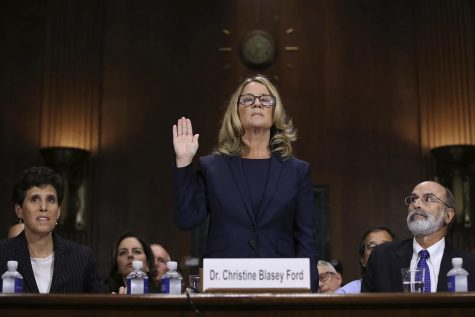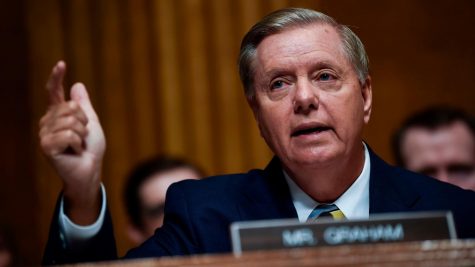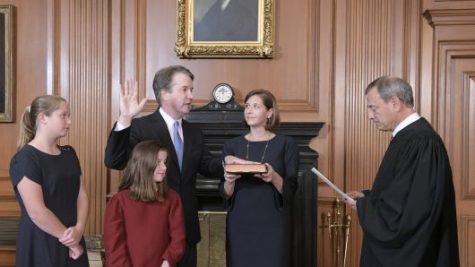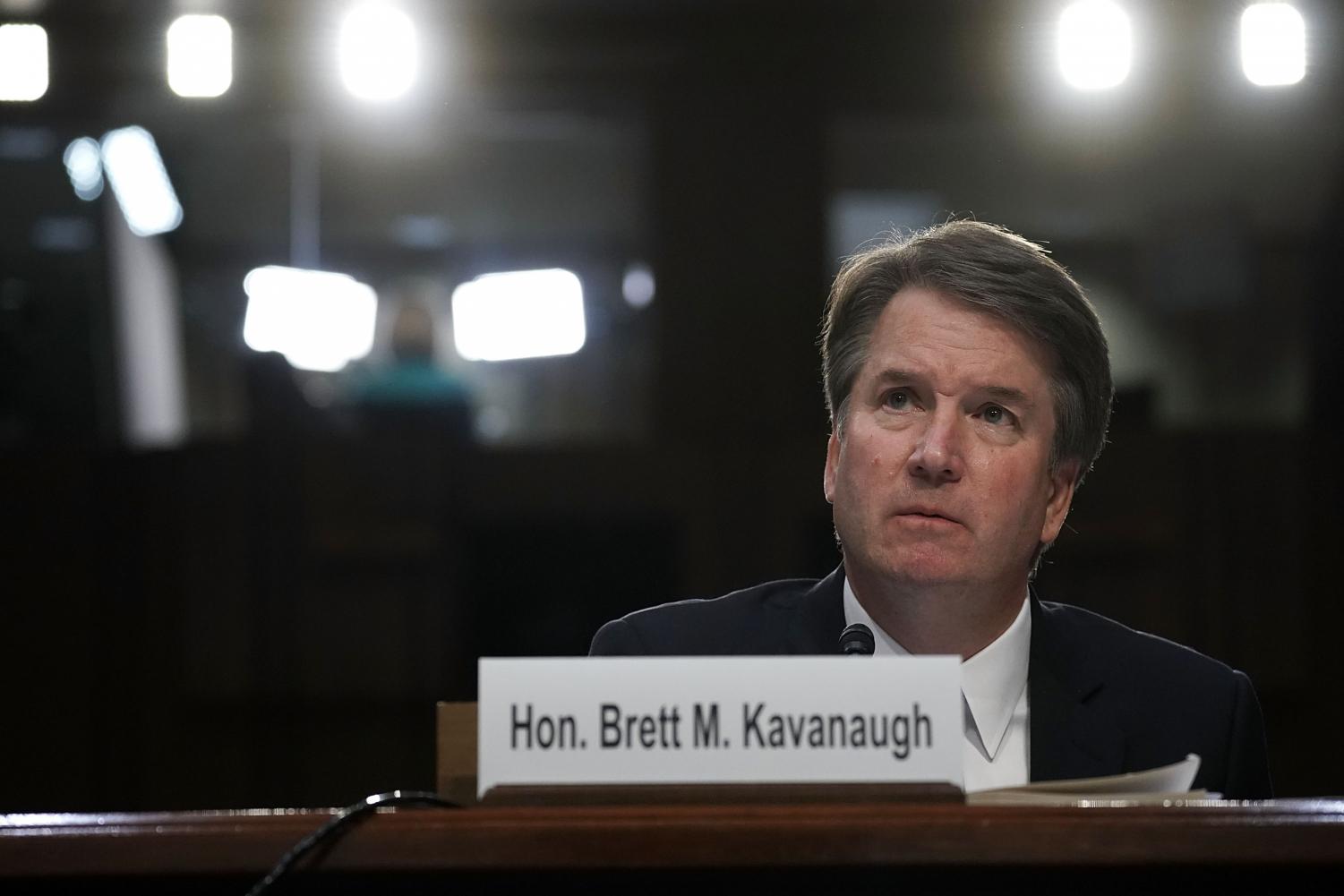Your donation will support the student journalists of The Tide, Richard Montgomery High School's student newspaper. Your contribution will allow us to purchase equipment and cover our annual website hosting costs.
Kavanaugh confirmed by Senate after heated nomination process
October 11, 2018
Last Saturday, Oct. 6, the Senate confirmed Judge Brett Kavanaugh to the Supreme Court of the United States. For the past few weeks, the eyes of the public and the press have been on Kavanaugh after Dr. Christine Blasey Ford’s astonishing sexual assault allegations.
Two weeks ago, Ford and Kavanaugh both testified in front of the Senate after about a month of heavily partisan debate on a national scale. Republicans accused Democrats of providing fake, unsubstantiated allegations to push the nomination to midterms, while Democrats pushed against the nomination of Kavanaugh, describing him as a rapist unfit for the Court.
These arguments came after a shocking Washington Post article published on Sept. 16, which centered around an interview with Ford, a research psychologist at the Stanford School of Medicine. Ford recounted an incident 30 years ago in Montgomery County when Kavanaugh allegedly assaulted her. As the Washington Post wrote, she described “Judge Kavanaugh pinning her on a bed, trying to take her clothing off and covering her mouth to keep her from screaming.”
In the interview, Ford said, “I thought he might inadvertently kill me.”
The interview ignited a major conflict, fueled not only by some’s disgust and anger but also by further accusations against Kavanaugh. In an interview with the New Yorker, Deborah Ramirez, a volunteer coordinator for the Boulder County Housing and Human Services, described an encounter with Kavanaugh during her freshman year at Yale University where he exposed his genitals in front of her face.
Julie Swetnick, a web developer, posted a public statement on Twitter about Kavanaugh’s drinking habits and abusive sexual behavior. She recollected multiple parties with Judge Kavanaugh and his friends in the 1980s where Kavanaugh and his friend Mark Judge engaged in “abusive and physically aggressive behavior toward girls.”
Below is my correspondence to Mr. Davis of moments ago, together with a sworn declaration from my client. We demand an immediate FBI investigation into the allegations. Under no circumstances should Brett Kavanaugh be confirmed absent a full and complete investigation. pic.twitter.com/QHbHBbbfbE
— Michael Avenatti (@MichaelAvenatti) September 26, 2018
Kavanaugh’s response to these three allegations was outright denial. According to the New York Times, he called Ramirez’s claims “a smear” and Swetnick’s allegation “ridiculous and from the ‘Twilight Zone.’” Many Republican senators, along with President Trump, supported his indignation.
In a string of tweets, Trump expressed his own fury, describing the allegations as a “big fat con” orchestrated by the Democrats.
The Democrats are playing a high level CON GAME in their vicious effort to destroy a fine person. It is called the politics of destruction. Behind the scene the Dems are laughing. Pray for Brett Kavanaugh and his family!
— Donald J. Trump (@realDonaldTrump) September 26, 2018
The Supreme Court seat first opened when Justice Anthony M. Kennedy announced his retirement over the summer on June 27. But unlike typical Supreme Court nominations, filling Kennedy’s seat carried a unique significance.
“Every Supreme Court nominee is significant, but this one is particularly significant because the nominee is replacing Anthony Kennedy, who for 30 years has been considered the moderate swing vote on the Court,” U.S. Government teacher Jonathan Taylor explained. “He’s been the deciding vote in cases involving free speech, campaign finance, the rights of corporations and workers, the rights for gay and lesbian same-sex persons, death penalty cases, you name it.”
Furthermore, with the upcoming midterms and the possibility of the Republicans losing control of the Senate, the need to push through a nomination was urgent. Trump’s list of potential nominees eventually narrowed down to one name: Brett Kavanaugh. Just over a week after Kennedy’s announcement, Trump announced Kavanaugh’s nomination on July 9.
For the following two months, Kavanaugh’s nomination seemed like a smooth road, as the FBI investigated him six times without finding anything. His impressive record as a Yale undergraduate and a Harvard law professor as well as his work under President George W. Bush and at the United States Court of Appeals for the D.C. Circuit portrayed him as a well-qualified nominee. However, this smooth road quickly changed.
According to CBS News, more than 20 million people watched the Kavanaugh-Ford hearings. Both Kavanaugh and Ford gave an opening speech and then answered questions from outside prosecutor Rachel Mitchell and finally the Judiciary Committee.
Ford testified first, remaining composed and collected throughout the entire hearing. Kavanaugh, on the other hand, maintained an emotional and somewhat aggressive tone in his opening statement and while responding to senators.

Dr. Christine Ford testifies before the Senate Judiciary Committee.
Ford’s opening statement was emotional yet also calm. “I am here today not because I want to be—I am terrified; I am here because I believe it is my civic duty,” she said before the Senate Judiciary Committee. She explained how this situation was painful for her and her family, and how she had no political motive in coming out with her allegations.
Many felt that Ford’s testimony was credible. When Senator Leahy asked Ford how sure she was that it was Kavanaugh who assaulted her, she responded, “100 percent.” When further asked about how she was so sure, she called on some of her own scientific knowledge.
Kavanaugh testified immediately after. He started off with an aggressive opening statement, denying the allegations and further describing the whole situation as a ‘circus’ and payback from the Clintons. “This grotesque and coordinated character assassination will dissuade competence in good people of all political persuasions from serving our country,” Kavanaugh said. “This confirmation process has become a national disgrace.”
Yet, seemingly genuine emotion accompanied his anger. “The other night Ashley and my daughter Liza said their prayers, and little Liza, all ten years old, said that ‘Ashley, we should pray for the woman.’ That’s a lot of wisdom from a ten-year old,” Kavanaugh said while holding back tears.
Besides Kavanaugh and Ford, a few senators also had notable statements to make, particularly Senator Lindsey Graham (R-SC).
“What you want to do is destroy this guy’s life, hold his seat open, and hope you win it in 2020… This is the most unethical sham since I’ve been in politics,” Graham said during Kavanaugh’s testimony, addressing the Democratic members of the committee. “This is not a job interview—this is hell.”

Senator Lindsey Graham voices his opinion during Kavanaugh’s hearing.
The controversy has also sparked much conversation at RM, located just a few miles away from the all-boys private school Kavanaugh attended, Georgetown Preparatory School.
“I feel that [Kavanaugh’s] temperament is a big issue because as a Supreme Court justice you have to deal with a lot of controversial topics,” sophomore Julian Saint-Denis said.
Another student who wished to remain anonymous added, “I just don’t even know what our legal system is anymore. I am more concerned about that rather than his confirmation or anything… because rule of law to me matters more.”
The following day, the Judiciary Committee voted on Kavanaugh in favor of confirmation by a 11-10 margin. At the end of the meeting, Senator Jeff Flake (R-AZ), convinced by Senator Chris Coons (D-DE) and numerous protesters, called for an FBI investigation into Dr. Ford’s allegations.

Kavanaugh is sworn in as an Associate Justice by Chief Justice John Roberts.
After the FBI investigation revealed that no further evidence could be found confirming Ford’s allegations, the Senate finally voted on Kavanaugh’s confirmation. Almost three months after his nomination, Kavanaugh has been confirmed to the Supreme Court with a majority vote of 50-48.
